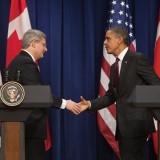I write this not just as a New Year’s thought but also as one looking personally at his ninth and presumably last decade. And a sad scene I see.
From the commencement of time ownership and control of societies have been shared, preposterously unfairly, between “them that has and them that doesn’t”.
It continues today as never before. What the super rich don’t own, they control. 100s of thousands of jobs, thanks to the computer, have been exported to lands where labour is dirt-cheap and where benefits are minimal if they exist at all.
We are witnessing the corporatization of our government by the powerful. It’s an easy task, for the ordinary MP or MLA, by reason of our rotten system, does what his or her leader orders. The decisions of society are no longer made by parliaments – if they ever were – but in the corporate boardroom.
A question or two:
What say did you have re: fish farms? What say have you about the huge damage these farms present? What say have you now on new licenses?
What say have you had in the destruction our rivers by large and very rich foreign companies? Have you agreed that it’s a good thing that these private sector companies get a sweetheart deal, where they sell power to BC Hydro for more than twice what it’s worth, forcing Hydro to buy this power at a huge loss when they don’t need it?
BC Hydro is technically bankrupt – is that what you thought you would have when the Campbell government set forth its private energy policy, turning over power production to rich companies like General Electric?
What say did you have in the privatization of BC Rail where the Campbell government gave our railroad away in a crooked deal that the government hushed up?
What about the Enbridge Pipeline scheduled to ship hundreds of thousands of barrels of Tar Sands gunk (aka bitumen) from the Alberta to Kitimat? Have you had a say in this matter? The only reason to send this gunk to Kitimat is so that it can be shipped down our coast through the most dangerous waters in the world – have you had a say in this?
Of course you haven’t and it’s instructive, I think, to note that Premier Clark will only express her opinion after the rubber stamping National Energy Board has deliberated.
Premier Photo-Op doesn’t seem to understand that the approval of the pipeline means oil tankers at almost one a day sailing down our pristine coast line.
Is the premier that dumb?
Or is it that her government is prepared to approve tanker traffic?
The companies and politicians talk about minimal risk – the plain, incontrovertible fact is this:
THESE ARE NOT RISKS BUT CERTAINTIES WAITING TO HAPPEN.
The issue facing BC can be simply stated: will we give up our land and resources to the private sector and, while we do it, will we accept the destruction of our environment?
The Corporations say that these efforts, fish farms, private power, pipelines and tankers will being lots of money and lots of jobs into BC.
I ask two questions – what money and what jobs? Building fish farms, private dams and pipelines bring construction jobs, mostly to off shore crews, and leave behind a few caretakers to watch the computers. The profits go out of the province into the pockets of Warren Buffet and his ilk.
This is the fact Premier Clark must ponder and soon: will the public of BC simply accept these destructions of our beautiful province? Will they just simply shake their heads and go quietly?
In my view they won’t. Through the ages the long-suffering public takes so much and no more. Read your history, Madame Premier – there comes a tipping point where the public will take no more and in my judgment we have reached that point.
I beg of you, Premier, shake the scales from your eyes, look and think! This isn’t a right wing versus left wing matter but a question of right and wrong.
The last thing in the world I want to see is violence but I tell you fair that the decision rests upon you – if you don’t deal with the fish farmers, the energy thieves, the pipelines and tankers there will be violence, and that will be the legacy of the Campbell/Clark government.






